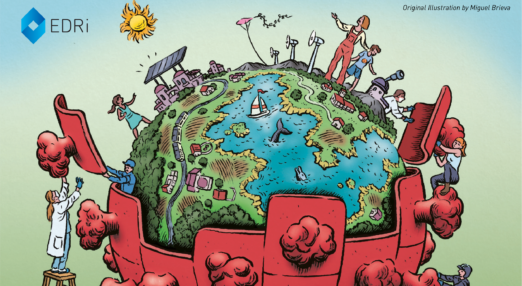tracking
Filter by...
-

Civil society complaint raises concern that LinkedIn is violating DSA ad targeting restrictions
On 26 February, EDRi and its partners Global Witness, Gesellschaft für Freiheitsrechte and Bits of Freedom have submitted a complaint to the European Commission regarding a potential infringement of the Digital Services Act (DSA).
Read more
-

Warnings from the UK: 24/7 racialised GPS surveillance
Campaigners assembled outside Capita PLC’s Annual General Meeting in the City of London on Thursday 11 May are contesting the outsourcing company’s £114m contract to deliver 24/7 GPS monitoring services, used by the Home Office to surveil people without British citizenship.
Read more
-

TrustPid: Baking ad tracking into the internet infrastructure
A consortium of Europe’s largest telecommunications operators (telcos) has proposed a new kind of tracking ads system to challenge commercial surveillance heavyweights like Google and Facebook. The new tracking system, misleadingly dubbed ‘TrustPid’, would be baked into the internet’s network infrastructure – potentially with little recourse or defence for users.
Read more
-

Challenging the use of GPS tags to monitor asylum seekers in the UK
The latest rollout of GPS tags to monitor migrants is another step in creating a 'hostile environment' for asylum seekers in the UK.
Read more
-

Electronic monitoring using GPS tags: a tech primer
Electronic tags have been a key part of criminal justice for many years throughout the world. As traditional radio-frequency tags are replaced by GPS ankle tags, we examine how these different technologies work and the seismic shift that will result from 24/7 location monitoring and data analytics, enabled by GPS tags.
Read more
-

Luca contact tracing app: CCC calls for an immediate moratorium
A dubious business model, defective software, irregularities in the awarding of contracts: EDRi member, Chaos Computer Club (CCC) demands an immediate end to federal funding for the “Luca” contact tracing app.
Read more
-

Buy a phone, get a tracker: unauthorized tracking code illegally installed on Android phones
EDRi's member noyb launched further action against Google’s AAID (Android Advertising Identifier), following similar complaints against Apple’s IDFA. The somewhat hidden ID allows Google and all apps on the phone to track a user and combine information about online and mobile behaviour. While these trackers clearly require the users’ consent (as known from “cookie banners”), Google neglects this legal requirement. noyb therefore filed a complaint against Google’s tracking code AAID.
Read more
-

Google’s FLoC Is a Terrible Idea
Google is leading the charge to replace third-party cookies with a new suite of technologies to target ads on the Web. And some of its proposals show that it hasn’t learned the right lessons from the ongoing backlash to the surveillance business model. In this post, EDRi's member Electronic Frontier Foundation (EFF) will focus on one of those proposals, Federated Learning of Cohorts (FLoC), which is perhaps the most ambitious—and potentially the most harmful.
Read more
-

Big Tech’s dominance: only laws can limit its power
Big Tech companies like Facebook have grown so large that the U.S. antitrust authority F.T.C. is considering breaking them up. We need laws that limit the power tech firms wields over our lives.
Read more
-

Benefiting whom? An overview of companies profiting from “digital welfare”
Could private companies be the only ones really profiting from digital welfare? This overview from EDRi member Privacy International looks at the big players.
Read more
-

Web browser privacy: ARTICLE 19 welcomes initiatives to protect users
There are widespread web tracking practices that undermine users’ human rights. However, safeguards against web tracking can and are being deployed by various service providers. EDRi member ARTICLE 19, and more generally EDRi as a whole, support these initiatives to protect user privacy and anonymity as part of a wider shift toward a more rights-respecting sector.
Read more
-

COVID-Tech: Surveillance is a pre-existing condition
In EDRi’s series on COVID-19, COVIDTech, we will explore the critical principles for protecting fundamental rights while curtailing the spread of the virus, as outlined in the EDRi network’s statement on the virus.
Read more
